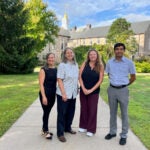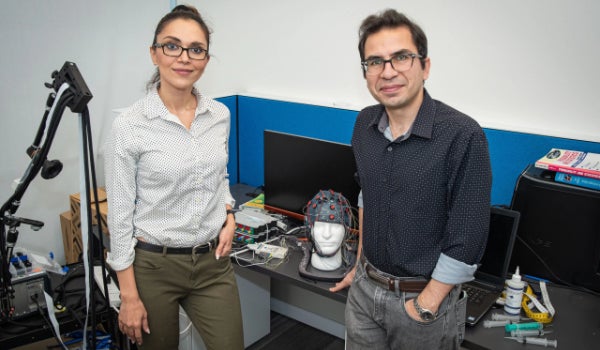The URI Department of Electrical, Computer, and Biomedical Engineering offers a dynamic, multidisciplinary environment. Our programs develop expertise in Electrical Engineering (power systems, electronics, renewable energy, robotics), Computer Engineering (hardware, software, AI, cybersecurity, high-performance computing), and Biomedical Engineering (medical devices, biosensors, wearable technology), preparing students for technological innovation. Our faculty conduct pioneering research in fields such as AI, robotics, cyber-physical systems security, integrated circuit design, power electronics, wearable biosensing, brain-computer interfaces, and neural robotics. Students gain hands-on experience in state-of-the-art labs.
Our department has a rich history of innovation, having established the first NSF Robotics Research Center and introduced the nation’s first microprocessor courses. We continue to lead the way by integrating AI and ML into our curriculum. Students will take rigorous capstone projects with industrial advisors and benefit from our unique programs, such as the International Engineering Program, Accelerated B.S./M.S. Program, and minors in robotics, cybersecurity, and entrepreneurship.
Recent News
 2025 Biannual IEEE Underwater Acoustic Signal Processing Workshop - The University of Rhode Island held the biannual IEEE Underwater Acoustic Signal Processing Workshop last month. The workshop has been hosted at University of Rhode Island every other year since 1985.
2025 Biannual IEEE Underwater Acoustic Signal Processing Workshop - The University of Rhode Island held the biannual IEEE Underwater Acoustic Signal Processing Workshop last month. The workshop has been hosted at University of Rhode Island every other year since 1985. Grad student seeks to build impactful medical robotics - Ali Rabiee joined the Translational Neurorobotics Laboratory in 2023, which focuses on biosignal control systems and medical robots with AI-enabled control strategies.
Grad student seeks to build impactful medical robotics - Ali Rabiee joined the Translational Neurorobotics Laboratory in 2023, which focuses on biosignal control systems and medical robots with AI-enabled control strategies.  URI receives first-ever NIH T32 award - The award reflects years of cross-campus collaboration and positions URI as a national leader in transdisciplinary biomedical training.
URI receives first-ever NIH T32 award - The award reflects years of cross-campus collaboration and positions URI as a national leader in transdisciplinary biomedical training.



